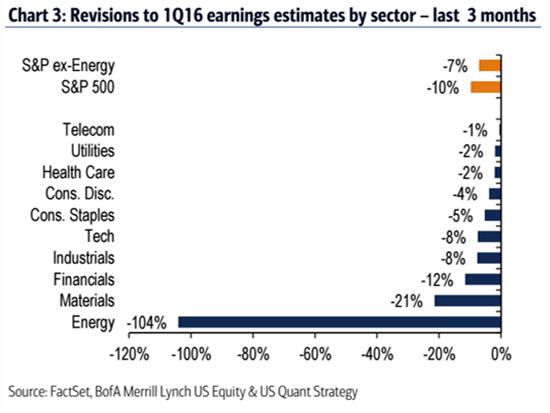Corporate profitability is one of the canaries in today’s financial coal mine. If companies are making more money each year they tend to hire more people, pay more taxes and generally make life easier for everyone else. But when earnings decline, everything from government budgeting to personal financial planning gets much harder.
Viewed through this lens, 2015 was a “coming to grips” year in which the financial markets vacillated over the meaning of falling corporate profits: Are they an aberration or the new normal?
The next corporate earnings season — commencing this week — will apparently settle the matter in favor of new normal:
Stand by for terrible news from Wall Street …
(Business Insider) – We are about to get confirmation that earnings growth for America’s biggest companies was negative in the first quarter, compared to the same period a year ago.
When aluminum giant Alcoa releases its results on Monday, it will mark the unofficial start of the heaviest reporting season for S&P 500 companies. Earnings [are projected to be] negative for a third straight quarter.
Earnings expectations for S&P 500 companies usually tumble in the months leading up to the heavy reporting weeks. This year, the drop was steeper than usual. Earnings estimates have dropped 9% year-to-date, more than double the 4% decline typically recorded three months before earnings season, according to Bank of America Merrill Lynch chief equity and quant strategist Savita Subramanian.

Obviously, energy-related companies will have the toughest comparisons since the price of their main product is down by about half year-over-year. But the bigger story is banking, where the environment has changed in ways that look disturbingly persistent.
Bank Stock Roundup: Dismal Q1 Earnings Picture Dominate; Citi & JPMorgan in Focus
(Zacks) – Major banking stocks remained under pressure over the last five trading days reflecting concerns over weak first-quarter 2016 results, due to commence next week. With investment banking revenues projected to be disappointing and a lower trading revenue outlook provided by some of the major banks, the earnings picture looks rather subdued heading into the first quarter results. Therefore, banks’ top lines are likely to remain largely under pressure.
Furthermore, banks will continue to be adversely impacted by a low-rate environment which is not expected to change any time soon. Per the minutes released of the Federal Open Market Committee (FOMC) meeting in March, an interest rate hike is unlikely in April as officials remain concerned about economic output and inflation to underscore their estimates. “Many participants expressed a view that the global economic and financial situation still posed appreciable downside risks to the domestic economic outlook,” the minutes cite.
Also, despite undertaking efforts to modifying their businesses and “client relationship” to comply with regulatory rules, questions regarding breakup of big banks into smaller manageable entities continue relentlessly.











Leave A Comment